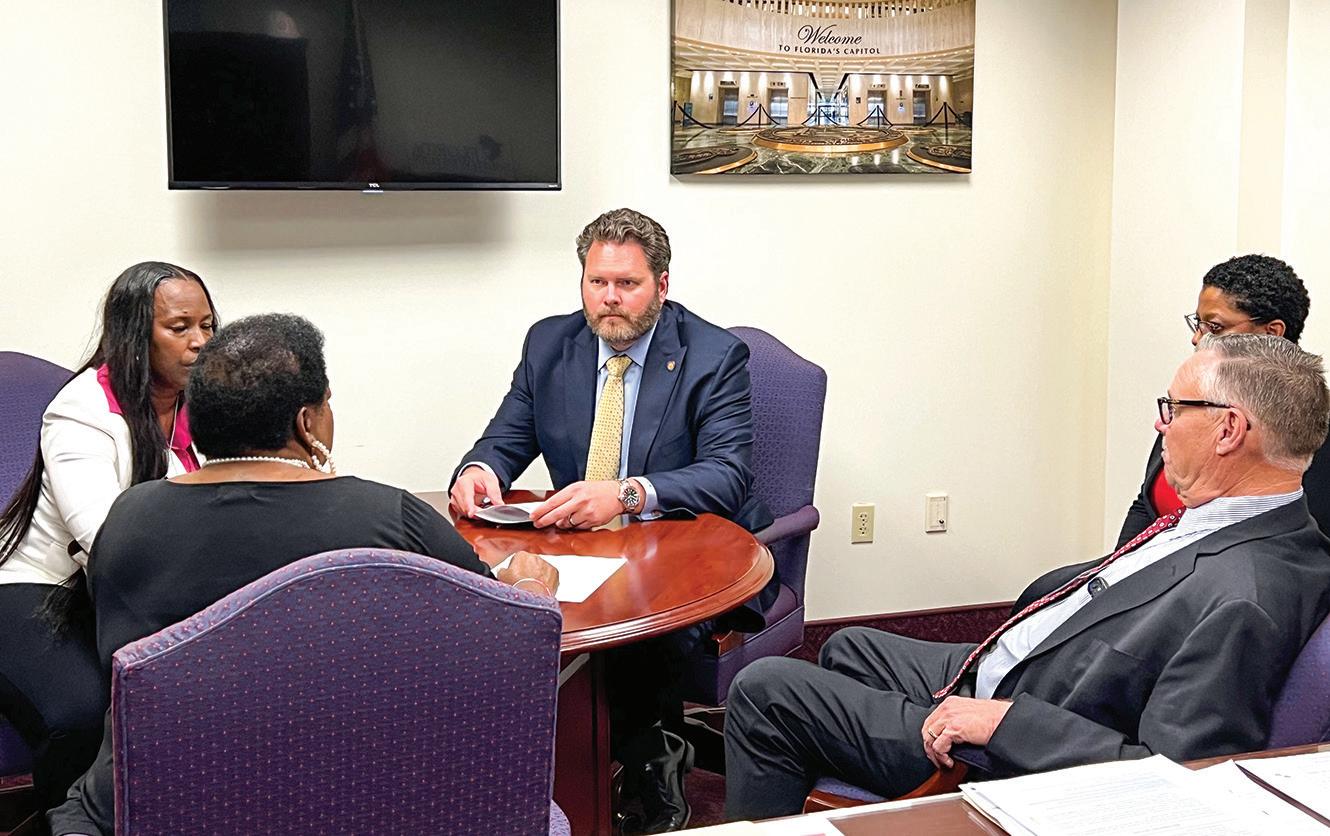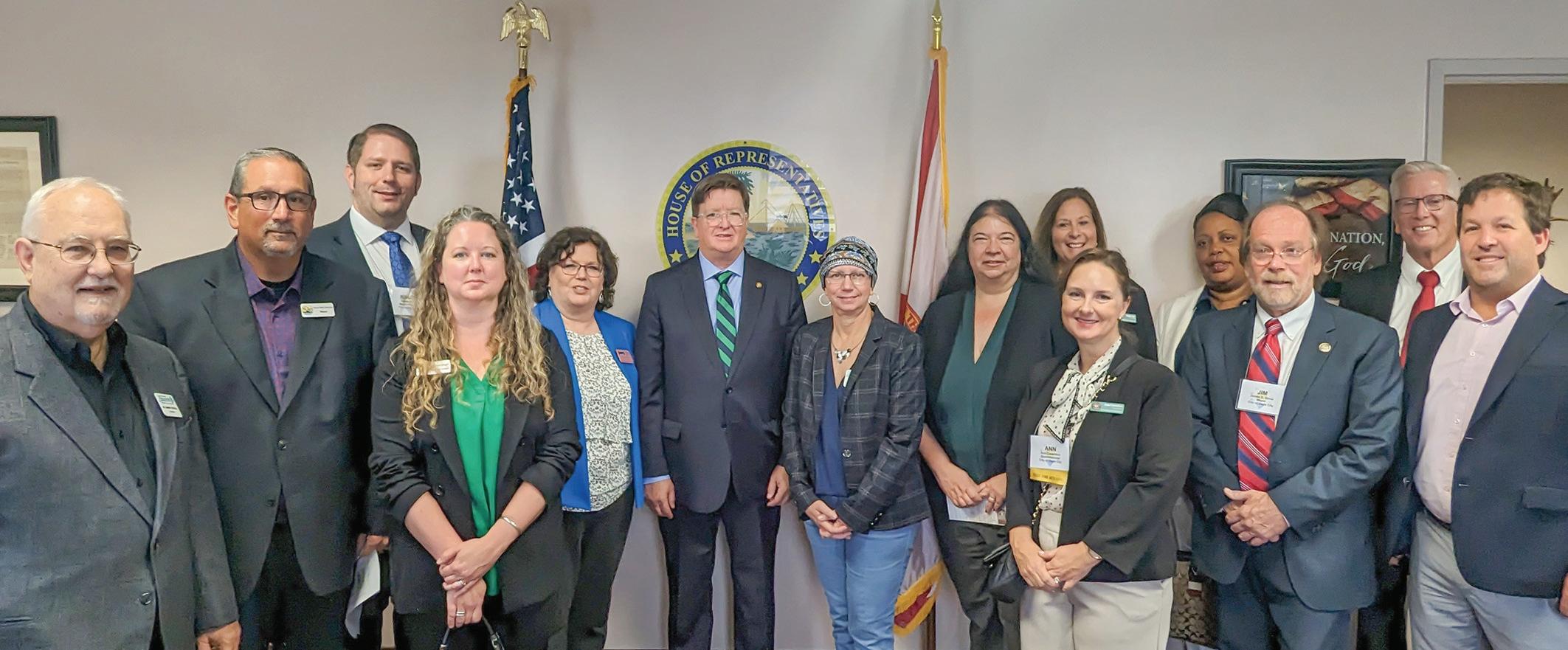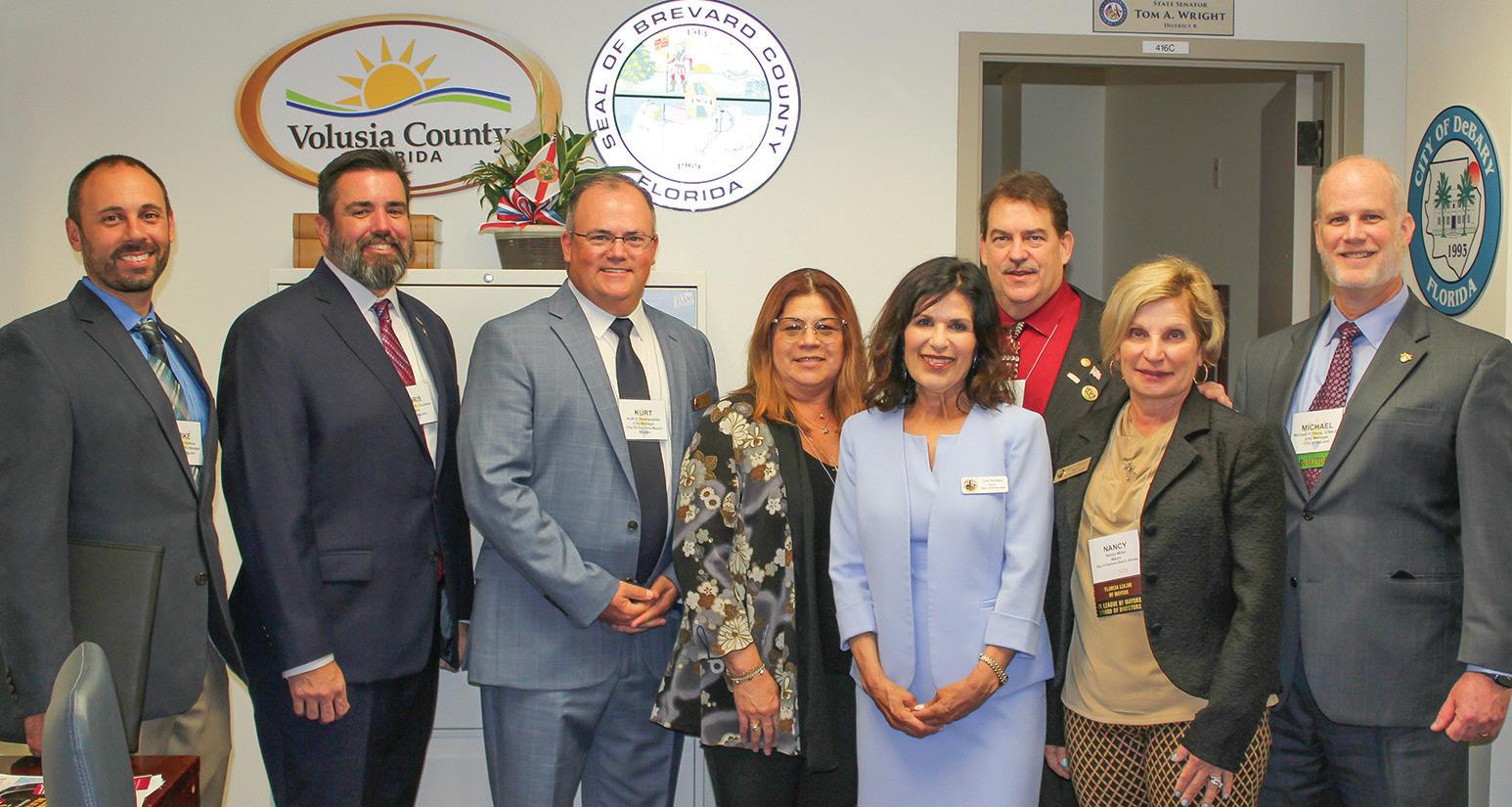
7 minute read
Relationships Drive Legislative Session
Municipal officials’ engagement was at the forefront
By Casey Cook, Florida League of Cities
Much of the success during the 2023 Legislative Session is attributed to the strong relationships that you, our members, have with your legislators. The relationships that you built and fostered leading up to and throughout session proved pivotal.
Some of you had new legislators serving in the House or the Senate. You built those relationships early, ensuring that your legislators see you as a resource for them. You provided the Florida League of Cities (FLC) Legislative Affairs Team with vital information so that we could tell better stories at the Capitol when we met with legislators. And you told your personal stories to the legislators that you’ve gotten to know over the last few months or years.
We also had greater engagement from our members this session, including higher participation in our Monday Morning Call-Ins and record-breaking registrations for Legislative Action Days. (See p. 40 for more on Legislative Action Days.) We gave legislative briefings to over 30 cities that came to Tallahassee to make sure that they felt comfortable speaking on our issues.
You engaged with the League often and when it mattered most. You met with legislators to advocate on behalf of our communities. You responded to the League’s legislative alerts by taking action. You picked up the phone to call your legislator when an important bill was up. And you thanked your legislator when they supported our position. You stood up for Home Rule, and it made a difference this session.

City officials from the Southwest Florida League of Cities meet with Sen. Jonathan Martin, center.
Legislative Recap
Because we have Home Rule authority, we rarely ask the Legislature to pass a law that allows us to solve a problem. Instead, most of what we fight for at the Capitol is preserving our ability to come up with local solutions and not have a onesize-fits-all approach implemented at the state level. In other words, we play 99% defense.
This year, several preemption bills put us on high alert early in session:
▸ Partisan local elections (HJR 405), a proposed Constitutional amendment that would have required cities to have partisan elections
▸ Solid waste management (SB 798 and CS/HB 975), bills eliminating solid waste franchises for certain property types in a city
▸ Municipal utilities (CS/HB 1331 and SB 1380), bills limiting enterprise fund transfers from utilities to general funds of cities
▸ Sovereign immunity (CS/HB 401 and SB 604), bills drastically raising sovereign immunity caps, thereby increasing the liability that cities would have
▸ Residential building permits (SB 682 and CS/HB 671), bills severely shortening the timeframe that residential building permits had to be approved.

From left, Sen. Tom Wright with Port Orange Mayor Donald Burnette, Town of Ponce Inlet Mayor Lois Paritsky and FLC Senior Legislative Advocate Jeff Branch.
The above bills died in committee. You, our members, were in your legislators’ ears early and often talking about the impacts that those bills would have on your communities. Those education efforts proved to be a difference-maker because the bills fizzled out about halfway through session. Because they never made it to the finish line, we successfully defeated those bills this year.
Sometimes threats emerge late in the process via floor amendments. The vacation rental bill (CS/CS/CS/SB 714) passed the full Senate and was later amended by the House with language that would have been detrimental to cities. Because of your advocacy, when the bill came back to the Senate for final approval, the Senate held firm and ultimately rejected that language. As a result, the bill died.

City officials from the Southwest Florida League of Cities meet with Sen. Jonathan Martin, center.
In today’s Legislature, if a bill makes it on an agenda, it’s pretty much guaranteed to pass through that committee. Most of what FLC’s Legislative Team does is try to keep bills off an agenda. Your advocacy efforts and the relationships you have with your legislators are a big part of this strategy.
Two major bills that were a priority of House and Senate leadership dealt with housing and the ordinance adoption process. The League was at the table and provided feedback to Senate leadership on what should be included and where our concerns were. The housing bill (CS/SB 102) is a comprehensive housing bill that sunsets after 10 years. If the legislative changes found in the housing bill cause problems for cities, we will pursue legislation to address them in upcoming sessions.

Local officials from the Suncoast League of Cities meet with Rep. Randy Maggard, center.
The local ordinances bill (CS/CS/SB 170), which returned from the 2022 Legislative Session, imposes new requirements on municipalities for adopting and enforcing ordinances. However, the League was instrumental in making significant changes to that bill from where it started last session and ended this session. The bill aims to ensure local governments know the impacts of pending ordinances on business in their community. The League successfully narrowed the scope of what needed to be included in those business impact statements.
Two areas where we proactively pursued legislation or appropriations were:
▸ Water and wastewater facility operators, part of the FLC Legislative Platform
▸ Cybersecurity.
The bills relating to water and wastewater facility operators, CS/CS/HB 23 by Representative Melony Bell and CS/CS/CS/ SB 162 by Senator Jay Collins, deal with license reciprocity for water and wastewater operators from other states moving to Florida. Cities are facing challenges in hiring operators to run their water and wastewater plans. These bills will, we hope, increase the number of licensed operators that could go to work for cities.

FLC members from the Volusia League of Cities.
Regarding cybersecurity, for the last two years, we’ve been successful in getting the state to set aside funding for local cybersecurity grants so that cities can protect themselves from hackers. We’re happy to report that $40 million was included in the FY 2023-2024 budget to continue those grants. This funding is for the Florida Department of Management Services to administer a competitive cybersecurity grant program. That program transfers nonrecurring financial assistance to local governments to develop and enhance cybersecurity risk management programs. (See the League’s cybersecurity portal at bit. ly/3LYdCKc.)
The bills above have passed both chambers and, at the time of publication, are awaiting action by the Governor.
This information is a just summary of legislation that impacted Florida cities during the legislative session. For more information on other bills, visit flcities. com/advocacy to access bill summaries, view the legislative Final Report and watch the FLC Post-Legislative Session Webinar.

Lake Hamilton Vice Mayor Marlene Wagner, left, with Rep. Jennifer Canady.
WHAT’S NEXT
Although this year we stopped these five preemption bills – partisan local elections, solid waste, municipal utilities, sovereign immunity and residential building permits – they will likely be back next year.
Advocacy doesn’t end with sine die. Building relationships with legislators is a year-round effort. You should spend the summer and fall educating your legislators on the real-world impacts of some of the bills that died this year. Know that we’re trying to build our army of proponents for next year.
The 2024 Legislative Session begins January 9, so we’ll be back into session prep again in just a few short months. Legislative committee weeks start in the fall, and the 2023 Legislative Conference will be held November 29 to December 1 in Orlando. (Stay updated with additional information on Legislative Conference at bit.ly/418JNen.)
Continue to foster relationships with your state leaders so that they better understand local government. Become a valuable and trustworthy source of information and insight on municipal issues. Successful advocacy starts at home, not in Tallahassee.
Casey Cook is Chief of Legislative Affairs for the Florida League of Cities.
Celebrate the 2023 Home Rule Heroes
Recipients of the Home Rule Hero Award are local government officials, both elected and nonelected, who consistently responded to the Florida League of Cities’ request to reach out to members of the Legislature and help give a local perspective on an issue. They worked tirelessly throughout the legislative session to promote local voices making local choices, protect the Home Rule powers of Florida’s municipalities and advance the League’s legislative platform.








